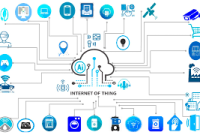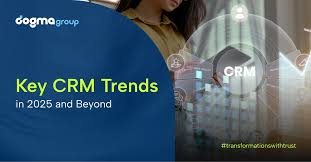Introduction
In 2025, the digital transformation of customer relationships has reached new heights, with Customer Relationship Management (CRM) systems at the forefront. These platforms have evolved far beyond contact management and sales tracking. Today, CRM systems serve as dynamic ecosystems that integrate data, artificial intelligence (AI), automation, and customer insights into a unified experience. This article explores how modern CRM solutions are reshaping customer experience (CX) in 2025, empowering businesses to anticipate needs, personalize engagement, and foster lasting loyalty.

1. The Evolution of CRM Systems
CRM systems have undergone a significant transformation over the past decade. Originally deve
loped to manage sales contacts and track interactions, CRM platforms have embraced technological innovations that enable predictive analytics, omnichannel support, and real-time personalization. In 2025, CRM platforms such as Salesforce, Microsoft Dynamics 365, and HubSpot offer modular, AI-driven capabilities tailored to specific industries.
Key milestones in CRM evolution include:
- Integration with artificial intelligence (AI) and machine learning (ML).
- Real-time data synchronization across channels.
- Enhanced mobile functionality.
- Cloud-based architecture enabling scalability.
- Integration with social media, IoT devices, and third-party apps.
2. Personalization at Scale
Customer expectations have shifted toward highly personalized interactions. In 2025, CRM systems harness AI and ML to analyze historical data, behavioral patterns, and customer sentiment to create unique, tailored experiences.
Examples of personalization include:
- Dynamic email campaigns based on individual preferences.
- Product recommendations generated by predictive analytics.
- Personalized web content driven by real-time user behavior.
- AI-powered chatbots that adapt their tone and responses based on user history.
CRM systems collect and analyze data from every touchpoint—email, social media, live chat, website visits—to build comprehensive customer profiles. This data is then used to segment audiences with precision and craft customized marketing journeys.
3. Seamless Omnichannel Experiences
Modern consumers interact with brands across multiple platforms. CRM systems in 2025 enable seamless transitions between channels, ensuring consistency and continuity in the customer experience. Whether a customer engages via a mobile app, website, social media, or in-person, CRM ensures all interactions are captured and contextualized.
Key capabilities include:
- Unified dashboards that display all customer touchpoints.
- Integrated customer service across live chat, phone, email, and messaging apps.
- Real-time updates across platforms, preventing repetition or miscommunication.
Omnichannel CRM strategies not only improve CX but also empower teams with relevant, timely data, reducing friction and enhancing service delivery.
4. AI and Predictive Analytics
AI-driven insights are revolutionizing how businesses anticipate customer needs. Predictive analytics within CRM systems can forecast behavior, identify churn risks, and recommend next best actions. In 2025, CRM platforms use natural language processing (NLP), sentiment analysis, and machine learning to interpret complex datasets and generate actionable insights.
Applications of AI in CRM include:
- Identifying high-value customers and targeting them with loyalty programs.
- Automating customer service inquiries using intelligent bots.
- Forecasting future sales and customer demands.
- Recommending optimal communication channels and timing.
5. Hyperautomation and Workflow Efficiency
CRM systems in 2025 incorporate hyperautomation—a combination of RPA (Robotic Process Automation), AI, and process mining—to streamline operations. Tasks such as data entry, follow-ups, lead scoring, and campaign scheduling are automated, freeing up human agents to focus on high-value activities.
Benefits of hyperautomation in CRM:
- Reduced operational costs.
- Improved data accuracy and consistency.
- Faster response times to customer queries.
- Scalable processes that adapt to business growth.
6. Integration with IoT and Smart Devices
The proliferation of IoT devices in homes and businesses has opened new avenues for CRM integration. Smart devices generate data that CRM platforms use to understand customer usage patterns and preferences.
Examples include:
- Smart home devices triggering personalized offers based on usage.
- Automotive CRMs providing maintenance reminders based on real-time diagnostics.
- Wearable health devices informing wellness product recommendations.
Such integrations allow businesses to proactively address needs, offer timely support, and create contextually relevant experiences.
7. Enhanced Customer Support with AI and Virtual Assistants
CRM systems now include advanced customer support functionalities powered by AI. Virtual assistants and chatbots handle routine inquiries, triage complex issues, and escalate matters to human agents when necessary.
Benefits of AI-powered customer support:
- 24/7 availability and reduced wait times.
- Personalized interactions based on CRM data.
- Consistent service quality across channels.
Some CRM systems even integrate voice recognition and emotion detection to further enhance support experiences.
8. Ethical Data Practices and Privacy Compliance
With greater access to personal data comes increased responsibility. In 2025, CRM systems embed privacy-first features and compliance tools that align with global regulations like GDPR, CCPA, and newer frameworks emerging in Asia and Africa.
Key compliance features:
- Consent management systems.
- Transparent data usage policies.
- Data anonymization and encryption tools.
- Role-based access controls to sensitive data.
CRM platforms now offer built-in tools to audit data practices, report breaches, and ensure accountability, fostering customer trust and brand integrity.
9. Democratization of CRM for SMBs
Advances in low-code/no-code platforms have made CRM systems more accessible to small and medium-sized businesses (SMBs). In 2025, affordable, customizable CRM solutions enable SMBs to deliver enterprise-level customer experiences.
Features empowering SMBs:
- Drag-and-drop workflow builders.
- Affordable pricing models and scalable subscriptions.
- Pre-built industry templates and automation rules.
- Integrated marketing and e-commerce tools.
This democratization helps level the playing field, allowing SMBs to compete on experience and innovation.
10. Real-Time Customer Feedback and Sentiment Analysis
Modern CRM systems include tools to gather and analyze real-time customer feedback. Through embedded surveys, review tracking, and social listening, businesses gain immediate insights into customer sentiment.
Benefits include:
- Immediate identification of issues or dissatisfaction.
- Continuous improvement through agile feedback loops.
- Enhanced product development based on customer input.
Sentiment analysis tools interpret tone and emotion in text and voice, offering nuanced understanding beyond traditional satisfaction scores.
11. Voice and Conversational CRM
-
Penggunaan teknologi pengenalan suara dan NLP (natural language processing).
-
Integrasi dengan asisten digital seperti Alexa, Siri, Google Assistant.
-
Penggunaan perintah suara untuk mengakses data pelanggan oleh staf penjualan.
12. CRM dalam Strategi CX Berbasis Komunitas
-
CRM sebagai alat untuk membangun komunitas pelanggan.
-
Mendorong interaksi peer-to-peer melalui forum dan grup sosial.
-
Mengintegrasikan feedback komunitas ke dalam pengembangan produk.
13. Gamifikasi dalam CRM
-
Menambah elemen game untuk meningkatkan partisipasi pelanggan.
-
Program loyalitas berbasis poin, badge, dan leaderboard.
-
Penggunaan gamifikasi dalam pelatihan tim internal untuk menggunakan CRM.
14. Peran CRM dalam CX B2B
-
Bagaimana CRM menyesuaikan pendekatan untuk perusahaan B2B.
-
Fokus pada account-based marketing (ABM).
-
Pelacakan siklus pembelian yang lebih panjang dan lebih kompleks.
15. Masa Depan CRM: Menuju CX yang Prediktif dan Proaktif
-
Peran teknologi seperti digital twin dan edge computing.
-
CRM prediktif yang memberi rekomendasi strategis bahkan sebelum pelanggan menyadari kebutuhannya.
-
Visi untuk CRM otonom (self-learning CX engine).
Conclusion
In 2025, CRM systems are not just tools for managing relationships—they are comprehensive platforms that drive strategy, empower employees, and delight customers. By embracing AI, hyperautomation, personalization, and ethical data practices, modern CRMs transform how businesses interact with customers. As technology continues to evolve, so too will the capabilities of CRM systems, shaping a future where customer experience is more intuitive, intelligent, and impactful than ever before.
